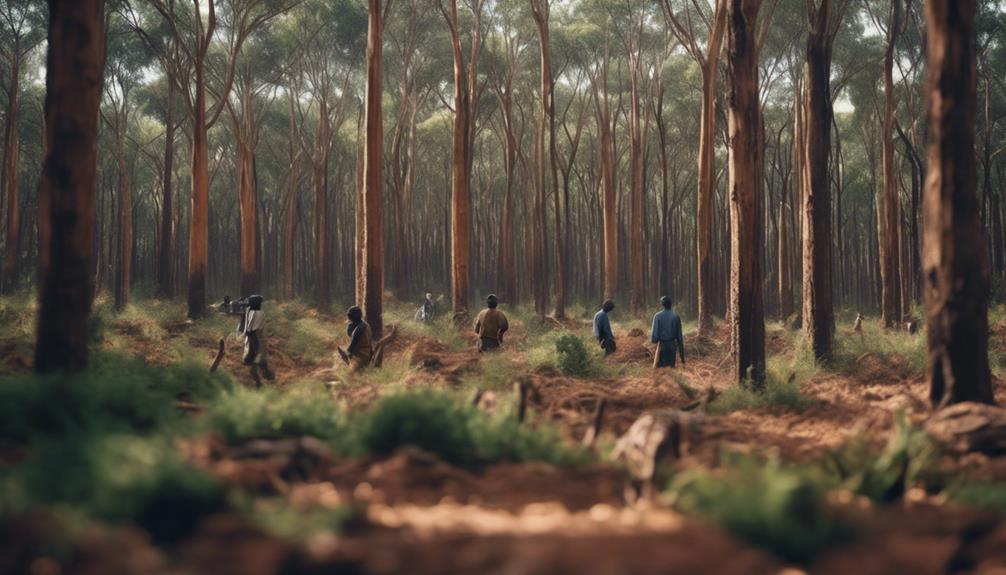The sustainability of South African timber for joinery is an increasingly vital issue in the woodworking industry. With a strong emphasis on environmentally friendly practices and responsible sourcing, South African timber shines for its dedication to preserving nature.
What distinguishes it from other options? By delving into the delicate balance between production methods, forest management, and regulatory frameworks, a clearer picture emerges of why South African timber is a top choice for sustainable joinery applications.
Key Takeaways
Why is South African Timber Sustainable for Joinery?
South African timber is an excellent choice for joinery due to its origins from renewable sources like cultivated pine or eucalyptus trees. With strict regulations ensuring sustainable sourcing, this timber protects the environment for future generations. Replanting trees helps remove carbon dioxide, making it an eco-friendly option. Choose South African timber for durable, sustainable joinery solutions.
Benefits of South African Timber
Benefits of South African Timber
The utilisation of South African timber offers a multitude of advantages that stem from its sustainable sourcing practices and positive environmental impact. Timber sourced from sustainably managed pine and eucalyptus plantations in South Africa not only ensures a continuous supply of timber without contributing to deforestation but also aids in replenishing felled trees by planting new saplings annually. This sustainable approach to timber production in South Africa plays a significant role in sequestering carbon dioxide from the atmosphere, making it an environmentally friendly choice for joinery projects.
Moreover, the forestry sector in South Africa is pivotal in preserving biodiversity, as these plantations provide habitats for various flora and fauna. Additionally, the economic benefits derived from the timber industry contribute to the country's economy. By supporting the local forestry sector, consumers of South African timber for joinery can participate in a sustainable practice that not only benefits them but also has positive implications for the environment and the economy.
Sustainability Practices in South Africa
Sustainable Timber Practices in South Africa
Sustainable timber practices in South Africa play a pivotal role in not only ensuring a consistent supply of timber for joinery but also in mitigating the environmental impact of deforestation and contributing to carbon sequestration efforts. Timber for joinery primarily comes from sustainably cultivated pine and eucalyptus trees in South Africa, where replanting efforts ensure that timber production does not lead to deforestation.
The country's extensive plantations not only provide a renewable source of timber but also aid in removing carbon dioxide from the atmosphere, promoting environmental sustainability. With indigenous forests covering a mere 0.4% of the land, the emphasis on sustainable timber practices becomes crucial for preserving these ecosystems.
Moreover, the forestry value chain, including joinery, significantly contributes to South Africa's economy and plays a vital role in supporting rural communities, highlighting the broader socio-economic impact of sustainable timber practices in the region.
Durability of South African Timber
Durability of South African Timber
Why is the durability of South African timber a significant factor in its suitability for various joinery applications? South African timber, such as Rhodesian Teak and African Mahogany, exhibits natural durability and resistance to decay, thanks to its high natural oil content. This inherent quality makes South African timber highly resilient against insects and fungal attacks, making it an excellent choice for outdoor applications like decking, pergolas, and exterior joinery. The minimal maintenance requirements of these timbers further enhance their appeal for joinery projects, as they are naturally resistant to rot and decay. The longevity of South African timber is a key attribute contributing to its sustainability in various joinery applications.
| Durability of South African Timber | Benefits |
|---|---|
| Natural resistance to decay | Longevity in joinery applications |
| High natural oil content | Minimal maintenance requirements |
| Resistant to insects and fungi | Suitable for outdoor joinery projects |
| Durable for outdoor applications | Sustainability in various joinery uses |
| Enhances longevity of joinery |
Environmental Impact of Joinery Timber
Amidst the context of joinery timber in South Africa, the environmental impact assessment reveals the interconnected relationship between sustainable forestry practices and ecosystem preservation. Joinery timber sourced from responsibly managed plantations in South Africa plays a crucial role in minimising environmental impact.
The timber used in joinery acts as a carbon sink, aiding in the sequestration of carbon dioxide and ultimately contributing to the reduction of greenhouse gases in the atmosphere. Furthermore, the sustainable production of joinery timber supports biodiversity conservation and promotes overall ecosystem health.
Certification of South African Timber
Certified by reputable organisations like PEFC and FSC, South African timber stands as a hallmark of sustainable production practices within the forestry industry. This certification ensures that South African timber originates from responsibly managed forests, meeting stringent environmental standards.
PEFC and FSC certifications guarantee that the timber not only adheres to sustainable practices but also supports ethical logging methods and biodiversity conservation. By promoting the use of certified South African timber, these organisations contribute to the country's green economy and endorse eco-friendly building practices.
The certification of South African timber plays a crucial role in upholding environmental, social, and economic sustainability standards, making it a preferred choice for joinery applications. Consumers seeking to align with ethical and environmentally conscious values can confidently choose certified South African timber, knowing that it upholds the highest industry standards and supports the preservation of forests for future generations.
Conclusion
In summary, South African timber is a great choice for joinery because it comes from renewable sources like cultivated pine or eucalyptus trees. By using this timber, you are helping to protect the environment for future generations. The regulations and certifications in place ensure that the timber is sourced sustainably, so you can trust that it's a good option for your projects. Plus, when trees are replanted, they help to remove carbon dioxide from the air, making a positive impact on the environment.
If you're looking for a reliable and eco-friendly option for your construction projects, South African timber is a fantastic choice. Its durability and sustainable practices make it a smart investment for the long term. Remember, if you need any help with your joinery needs, don't hesitate to reach out to Holzfleck for assistance.
Don't forget that you can also shop for Wooden Products on our site to find high-quality timber products for your projects. And if you're curious about pricing or want to learn more about our services, feel free to request a quote from us. We're here to help you make the best choices for your joinery needs.




